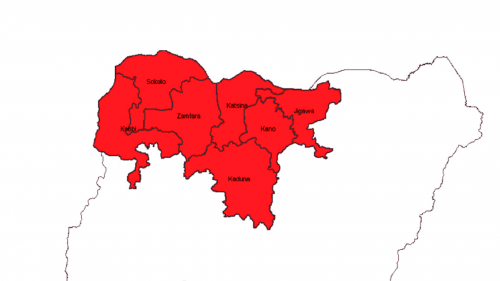Nigerians in Northwest geopolitical zone have expressed divergent views over the state of affairs in the country, just as the nation prepares to celebrate its 61st independence anniversary.
In a vox-pop conducted by the News Agency of Nigeria (NAN), some respondents were of the view that the country had a lot to showcase, 61 years after the disconnection of the umbilical code that linked it with Britain.
Others were however of the view that a lot still needed to be done as most of the basic infrastructures that determined the coming-of-age of a country, were yet to get fixed in the country.
They attributed the slow pace of progress to numerous factors, most of which bordered on poor leadership qualities.
Read Also: Nigerian youths and the ‘japa’ syndrome – By Fredrick Nwabufo
They also expressed concern that just as the leaders were trying to provide dividends of democracy under a situation of scarce resources, security challenges kept evolving on daily basis, dragging the hand of the clock backward.
In his assessment, Malam Yahaya Sarki, Special Adviser on Media to Gov. Atiku Bagudu of Kebbi State, said despite numerous challenges, Nigeria had progressed in many fields.
“In the case of this regime, the most visible progress has to do with the economic and agricultural sectors.
“This administration intensified efforts on diversification of the nation’s economy from oil to other sectors of the economy, particularly agriculture; many people have gone back to farm,” he said.
According to him, the Social Investment Programmes of the Federal Government are most outstanding, having touched the lives of many Nigerians.
On his part, Alhaji Umar Faruq, a senior civil servant in the state said even though the country was grappling with security challenges, key projects like standard gauge railway project, the second Niger bridge and the Gas pipeline project, were major achievements.
He lauded the present administration for embarking on standard guage rail construction from Lagos to Kano, Port Harcourt to Maiduguri, as well as a move to connect all state capitals with railway system.
However, he said the expectations of Nigerians were yet to be met fully considering the enormous resources God had endowed the country with.
Also speaking, a Human Rights activist, Ibrahim Nura, argued that Nigeria had been left behind when compared with its past contemporaries like Indonesia and Malaysia.
“We need to look inward and re-adjust if we really want to progress; we need to be patriotic; we need to have the fear of God in all our dealings,” he admonished.”
For Alhaji Sani Umar-Jabbi, the District Head of Gagi in Sokoto state, the major obstacle to the progress of the country was the attitude of Nigerians themselves, as such the key solution was change of attitude for the better.
According to him, vigorous attitudinal change that will bring about increased individual and community involvement in addressing the numerous challenges, is desirable.
Speaking along the same direction, a public affairs commentator in Sokoto, Mr Mu’azu Liman-Yabo, said a positive change in attitude would bring about peaceful coexistence, religious tolerance and security consciousness among people.
Liman-Yabo said Nigeria faced various conflicts and security challenges that needed collective efforts between community members, local authorities and officials of security agencies to tackle.
” More programmes are needed towards addressing conflicts, facilitating mutual understanding, religious tolerance, patriotism and respect for values of individuals,” he said.
Alhaji Abba Sidi, secretary of Inter Party Advisory Committee (IPAC) in Sokoto, suggested social re-orientation and increased awareness of political values.
His said that at 61, Nigerians deserved leaders that would record successes and strive for development projects and programmes.
On his part, Dr Auwal Ahmad-Musa, Executive Director of Productive Youths Development Initiative, a non-governmental organization advocating for good governance and accountability in Sokoto state, urged religious leaders to redouble effort in peace-building.
Meanwhile, a university Don, Prof. Mustapha Malam, has reminded Nigerians of the need to elect credible leaders, lest their dream of reaching the promised land remained an illusion to be pursued, but never attained.
Malam, who is the Dean, Faculty of Communications, Bayero University, Kano, said the call was imperative considering that the major obstacle to the nation’s progress, had remained poor governance, occasioned by bad leadership.
“People should see these challenges of governance in the past as a lesson-learning-opportunity to elect credible and capable leaders, with potentials to perform in 2023.
“For me, there are not much developments to talk about, especially at this period, when insecurity is at its highest ebb.
“The economy too is not as it is supposed to be in terms of the living condition of the citizens.
“And politically, there is tension in the polity all over; the cause of all these, being bad governance over along period,” he said
The Don stated that citizens were experiencing poverty, unemployment and insecurity, adding that although government was doing its best, a lot more needed to be done.
He urged the people to see those challenges as a clarion call to elect credible leaders who could deliver and move the nation forward.
On his part, the Deputy Speaker, Kano State House of Assembly, Alhaji Zubairu Massu, urged Nigerians to ensure the existence of one strong and united country.
While harping on the need for collaborative efforts between all tiers of government, Massu said he was optimistic that despite the challenges, the nation would get to the promised land.
“We are not where we are supposed to be, but with commitment, zeal and patriotism, by the grace of God, we will be great,” he said.
For some residents of Katsina metropolis, their clarion call was for the prompt tackling of the security challenges bedeviling the country.
One of them, Alhaji Abdullahi Jibia, a political analyst, said despite the attainment of 61 years, the issue of insecurity had remained a hard nut to crack.
He said it was worrisome that the issue of insecurity had continued to drain resources and divert the attention of leaders from discharging their duties.(NAN)



Leave a Reply